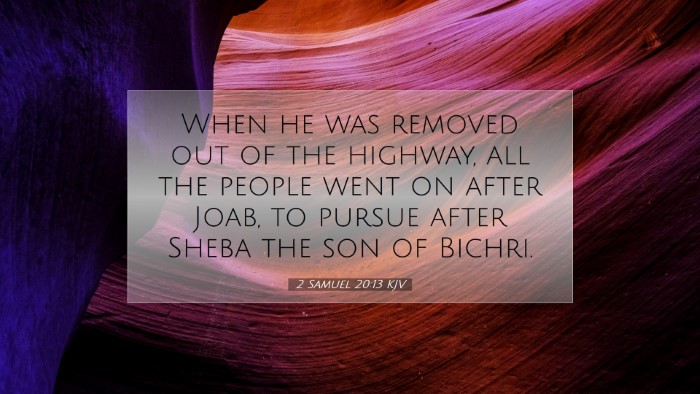Commentary on 2 Samuel 20:13
Verse Overview
2 Samuel 20:13 captures a moment of political intrigue and tension during the reign of King David. The verse states:
"When he was removed out of the way, all the people went on after Joab, to pursue after Sheba the son of Bichri."
This commentary will explore the implications of this verse, drawing insights from public domain sources such as Matthew Henry, Albert Barnes, and Adam Clarke.
Contextual Background
The context of 2 Samuel 20 speaks to a period of upheaval in Israel's history. Following the rebellion of Absalom, King David faced ongoing challenges to his reign. Sheba, a Benjaminite, took advantage of the unrest and led a rebellion against David.
This moment follows the death of Amasa, who was appointed by David to replace Joab as commander of the army. The killing of Amasa by Joab illustrates the internal conflict and power struggles present within David's leadership.
Analysis of Key Elements
1. The Removal of Amasa
According to Matthew Henry, Amasa's removal signifies the ruthless nature of power dynamics within David's reign. Joab's act of killing Amasa was sudden and brutal, showcasing the lengths to which individuals will go to secure their positions.
Albert Barnes observes that the violent nature of Amasa's death left a void that the people quickly filled with Joab's leadership. This reflects a tendency toward expediency over justice in moments of political chaos.
2. The People’s Allegiance to Joab
After Amasa's assassination, Adam Clarke indicates that the people's swift return to Joab illustrates the complexities of loyalty. Joab, though not a paragon of virtue, was viewed as more capable and reliable in times of crisis, thus commanding their support.
The people’s alignment to Joab also highlights their desire for stability, choosing the devil they know over the potential of new leadership, even if that leadership came with moral compromise.
3. The Pursuit of Sheba
Joab's pursuit of Sheba indicates a turning point in the narrative – a shift from internal power struggles to external threats. The rebellion led by Sheba could potentially unravel the stability that David sought to establish post-Absalom.
Henry notes the urgency of the moment; it was not merely about Amasa's death but about restoring order and eliminating threats to the king's rule. The transition from civil strife to military engagement is palpable here.
Theological Implications
In the theological reflections provided by the commentators:
- Leadership and Authority: The dynamic between Joab and Amasa serves as a crucial study into the nature of leadership. Leadership in times of chaos often requires hard decisions, and who we elevate into authority reflects our collective values and mistrusts.
- National vs. Personal Allegiance: The people's quick shift back to Joab raises questions about loyalty. Do they prioritize the stability of the nation over moral leadership, or vice versa?
- God's Sovereignty: The ongoing conflicts underscore God’s ultimate control over the affairs of nations. Each character in this drama – even those in rebellion – serves His purpose, teaching valuable lessons about divine providence amidst chaos.
Pastoral Applications
For modern pastors and students of the Bible, 2 Samuel 20:13 invites reflection:
- Understanding Human Nature: Just as the people gravitated toward Joab, communities often seek leaders who promise stability, irrespective of their morality. Leaders must strive for integrity and justice.
- Navigating Conflicts: The story reminds us of the necessity for conflict resolution within our congregations. It demonstrates that failing to address underlying tensions can lead to more significant issues.
- Reassessing Loyalties: The commentary asks us to reflect on who we follow and why. Are our allegiances aligned with God’s principles or the prevailing pragmatism of our environments?
Conclusion
2 Samuel 20:13 offers a profound glimpse into the complexities of leadership and the challenges of governance. By examining the elders’ choices in response to power struggles, we glean wisdom on fidelity, loyalty, and divine sovereignty. As we navigate our own challenges, this passage prompts us to align our pursuits with moral integrity and faithfulness to God.


